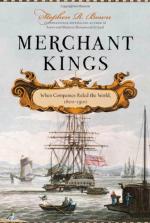|
This section contains 459 words (approx. 2 pages at 400 words per page) |

|
Amsterdam
This city was the capital of the Netherlands and the center of the mercantile interests that dominated the seventeenth and early eighteenth centuries. It was an entrance port for all of Europe, and it was the place where Dutch merchant companies held monopolies on trade in all the spices from the Far East. It was undergoing a renaissance in the arts, science and business throughout this time.
Spices
These dried and cured leaves, berries and other plant materials were used in a number of culinary and apothecary uses in Europe in the age of discovery. They were traded at exorbitant rates, reflecting the long journeys required to procure them from Asia. They were exploitable resources in colonial territories, and trade in spices built enormous mercantile empires in Europe.
Saltpetre
This is a chemical compound vital for the production of gunpowder. It was exported from India and Brown...
|
This section contains 459 words (approx. 2 pages at 400 words per page) |

|




